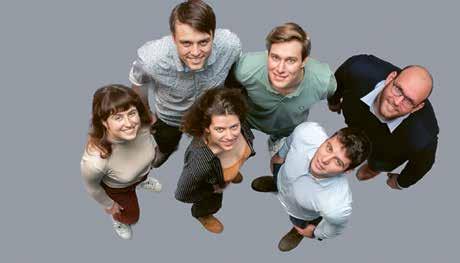
2 minute read
Afterlife
Our vision
Afterlife aims to revolutionize the way we feed the world while protecting the planet. Our innovative solution harnesses the abundant agricultural food waste found in the Netherlands and converts it into a valuable resource. Through fungal fermentation technology, we unlock the power of these overlooked resources, creating a sustainable protein ingredient that is both functional and delicious. This approach not only addresses the inefficiencies of our current food system but also meets the skyrocketing demand for ecofriendly plant-based alternatives. Join us as we create a future that is secure in food, protects the environment, and is filled with delicious, protein-rich foods.
Advertisement
Our solution
Afterlife offers a versatile mycoprotein as a solution to challenges faced by food manufacturers, particularly of meat alternatives. Plant-derived proteins have unwanted flavors, colors, and lack functional properties, leading to increased costs and compromised quality. Additionally, they require extensive land and water usage, resulting in a high environmental footprint. Afterlife’s mycoprotein addresses these issues with a neutral taste, color, and unique functional qualities. The magic happens inside a bioreactor, reducing land and water requirements, and lowering scope 3 emissions. Moreover, it caters to the rising trend of soy and nut allergies. Overall, Afterlife’s mycoprotein provides an opportunity for innovative, sustainable, and allergy-friendly food products.
About the team
All of us Afterlifers are master students at Wageningen University with different backgrounds. We individually bring to the table specialized skills in biosystems engineering, biotechnology, food technology, sustainable business, and environmental sciences. We are dedicated to revolutionizing the food industry by offering versatile and sustainable protein alternatives that meet evolving customer needs, fostering a healthier and more sustainable future.
Team members:
Tijmen Visser
Giulio Mornati
Marisol Calderon
Tim Bongers
Kristina Smieskova
Our vision
Energy efficiency is an important way to reduce carbon emissions from buildings and thermal insulation is an easy and effective means of achieving this. Our vision is to make housing more sustainable, affordable, and less damaging to human health by providing insulation materials with a low carbon footprint from up-cycled rapeseed stalks. We plan to launch our business in Europe, then expand globally. Our goal is to create a direct clean waste stream from rapeseed stalk agricultural companies and farms to insulation production and to give people the choice to be part of global change for a sustainable construction economy.
Our solution
The project aims to utilize rapeseed stalk as an ingredient for insulation materials. Lower thermal conductivity indicates a better insulation material. Conventional insulators cause skin and airway irritation due to small pieces or chemicals getting released. This is not an issue with our more natural, nontoxic, allergen-free product which can be safely handled and installed without extra safety equipment required for the installation of conventional insulators. Moreover, while conventional insulators are often only onetime use and need several human lifetimes to degrade, causing health hazards while doing so, our product can be reused and recycled, and are fully biodegradable. The rapeseed stalk will be collected from agricultural companies, farms and trials will be made to achieve a more sustainable and affordable insulating board.
About the team
BB&B is a group of five international students from different universities with backgrounds in Environmental and Biobased Technology, Biobased Sciences, Plant Biotechnology, Food Technology, and Environmental Technology. This mixture of knowledge enables us to see from various perspectives how to process food waste into construction materials that result in lower carbon emissions. We want to contribute to a cleaner, more sustainable future.
Team members:
Muhammad Haikal
Larissa Markus
Muskan Mathur
Florence Ignatia
Kingdavid Ozobodo








